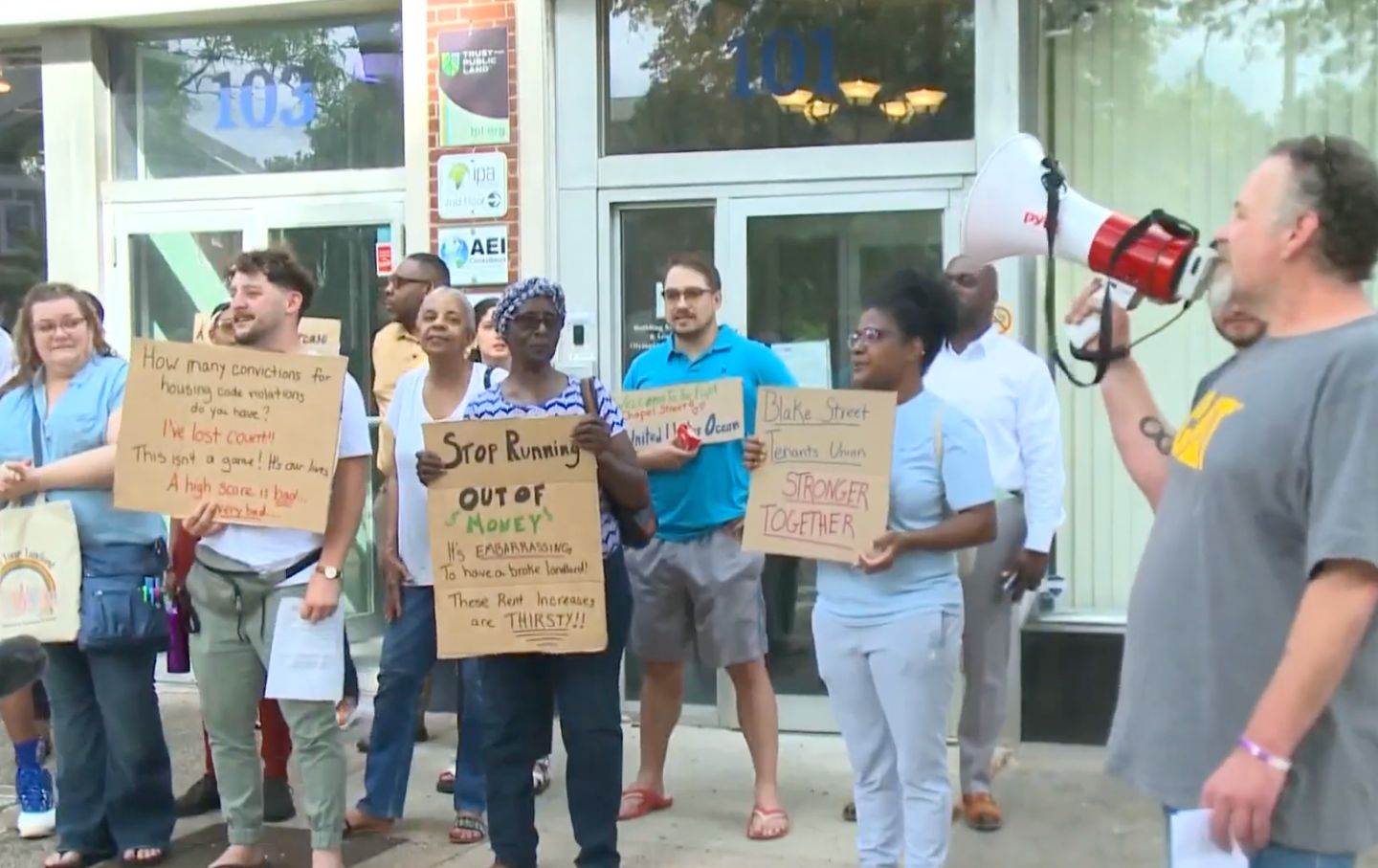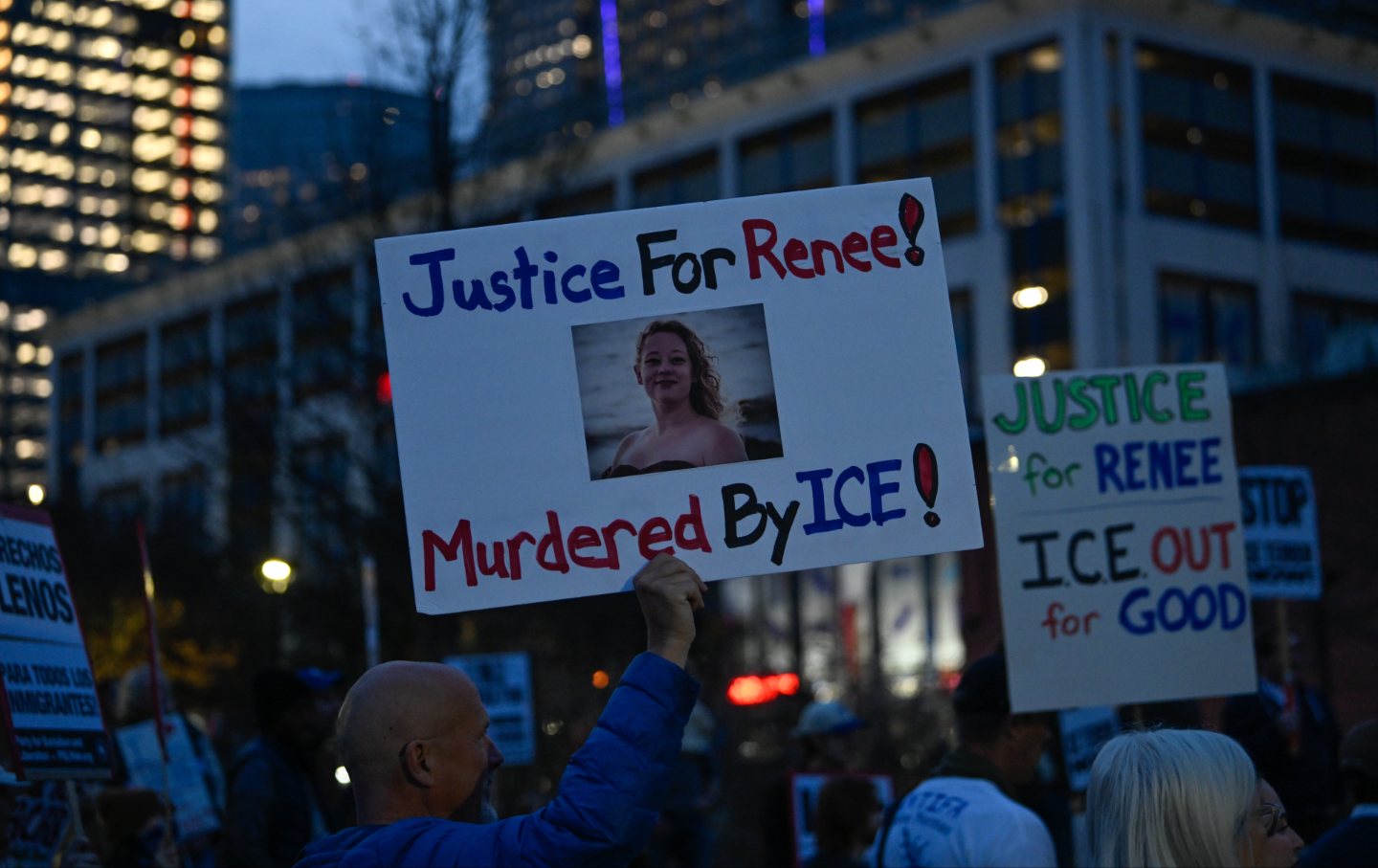The Connecticut Tenants Union Trying to Buy Their Apartment Building
Members of the Blake Street Tenants Union in New Haven see community ownership as critical to preserving affordable housing. Is now the time for widespread tenant control?

Tenants in New Haven hosting a rally outside Ocean Management’s office.
(YouTube)
The last time her apartment changed ownership, ShamelYah Yasharel found herself lining the rooms with mousetraps.
In January 2022, Ocean Management bought Yasharel’s building, a 70-unit complex in New Haven, Connecticut. Under the mega-landlord, conditions quickly deteriorated. Tenants experienced heating issues, faulty electrical wiring, and broken fire alarms. Rusty nails littered the basement. “Every mousetrap kept being full,” Yasharel said. “They kept being full, and they kept coming and coming.”
As unanswered maintenance requests accumulated, tenants at Yashrael’s building, 311 Blake Street, knocked on doors to organize their neighbors. The tenants decided to unionize—banding together to collectively bargain over issues of rent, evictions, and maintenance. At the time, there were only one or two tenant unions in the area. When New Haven passed tenant union legislation in the fall of 2022, Blake Street became the first union formally recognized by the city.
In the last two years, the Blake Street tenants have found remarkable success wielding their collective power. Last August, during negotiations over rent hikes, Ocean served 16 union members eviction notices. Tenants responded with a lawsuit accusing the landlord of retaliation and a rally outside city hall that drew hundreds of protesters, forcing the landlord to rescind the evictions and return to the bargaining table. Those negotiations ended with the first collectively bargained leases in Connecticut—one of only a few in the entire country.
But this June, tenants received destabilizing news. Over the past year, the union had watched as the landlord sold dozens of its other properties across the city. Now Blake Street—once considered Ocean’s flagship property—was on the market.
“At first it was really scary,” said Yasharel, a lifelong New Havener with nearly three decades of experience organizing as a steward for Connecticut’s hospitality workers’ union. She served as one of three tenants on the union’s negotiating team. “Now, I’m figuring: ‘well, we’re gonna have to start all over again.”
But as the union and organizing partners discussed what this sale might mean, a novel idea emerged: what if the tenants could purchase the building––for themselves?
The idea of tenant control was obviously compelling. Tenants at Blake Street could shake off a neglectful, unresponsive landlord and keep their homes off the speculative real estate market. In April, the stench of rotting garbage had greeted tenants when they exited the building—Ocean had stopped paying for trash collection. In one unit, a neighbor’s tub leaked through the ceiling for months as Ocean ignored maintenance requests.
If tenants controlled the building—instead of a new landlord who could squeeze money out of the property with rent increases—they could invest the money generated back into the property, addressing maintenance problems and keeping their building safe and affordable.
The tenants also had an unusual opening. At nearly $14 million, the Blake Street apartments are heavily overvalued in the current market, and an initial flurry of buyer interest subsided without any offers. Ocean was dealing with serious financial mismanagement. In the past two years, the landlord had sold dozens of properties, and last spring, it settled a large lawsuit for lead poisoning of a child at one of its properties. A few years ago, it would have been hard to imagine selling the Blake Street apartments, but now Ocean was struggling to find buyers, leaving tenants time to strategize.
Yet the path to taking control of their building was far from clear. The tenants would first have to find the money to place a competitive offer, and then define a system of collective ownership. The task would require tenant organizers to wade into the world of real estate acquisition and financing—revealing fallacies and contradictions at the heart of the way our rental housing market works.
Many historians trace the first affordable housing cooperatives in the United States to the early 20th century, and over the last 100 years co-ops have taken different forms, often as a tool in anti-displacement struggles. Several housing organizers and nonprofits focused on affordable housing told me that in recent years they’ve observed a surging interest in collective tenant ownership. Tara Raghuveer, founding director of KC Tenants and the national Tenant Union Federation, believes that widespread tenant control will be a critical tool in the fight for safe and affordable housing. “The potential for tenants to purchase and then collectively own property represents the only long-lasting pathway to tenant power.”
Popular
“swipe left below to view more authors”Swipe →The Blake Street Tenants Union is part of the larger Connecticut Tenants Union, which organizes tenants across the state. Community ownership has been a key part of CTTU’s long-term strategy. In 2023, CTTU voted to create a social housing committee to explore the possibility of acquiring smaller buildings around the city. When the Blake Street apartments went on the market, the committee mobilized: Purchasing the 70-unit apartments would be a bold move toward their vision of community-controlled housing.
Organizers had a few contemporary models. A few hours north, the Boston Neighborhood Community Land Trust had seen success intervening in sales to preserve affordable housing. In Minneapolis, the nonprofit Inquilinxs Unidxs Por Justicia was working to wrest apartments from predatory landlords and into community control.
Tenants still faced serious obstacles. Organizers lacked expertise in real estate acquisition, and many funders dismissed the possibility that tenants could govern themselves. But the most pressing issue was money.
In the weeks after the listing was posted, CTTU met with a range of possible financial partners, from private “angel” investors and nonprofit partners, to benevolent landlords who promised to eventually transfer ownership of the building to tenants. “The fact of the matter is, landlords have a lot of wealthy friends that we don’t necessarily have,” said Hannah Srajer, president of CTTU.
For many landlords, one such friend is the federal government. More than a quarter of rental units across the country are financed with federally backed loans. Fannie Mae and Freddie Mac, two government-sponsored enterprises overseen by the Federal Housing Finance Agency, finance some eight million rental units in multifamily properties across the country. Through Fannie and Freddie, some of the wealthiest landlords—like Blackstone and Greystar—receive favorable loans backed by public money. Under this system, landlords can purchase rental housing at highly leveraged positions and rely on tenants to service their loans, creating an incentive to increase rent and cut costs.
For Srajer, this pool of federal funds for landlords illustrates a frustrating fallacy: Federal agencies entrust money to landlords with histories of neglecting buildings and pricing out low-income tenants, instead of the tenants themselves. “The people who live in these buildings, their self-interest is for their homes to be safe, secure, clean, healthy, and functional,” Srajer said. “They’re the ones who are going to best take care of these multi-unit complexes.”
Jessica Stamp, Blake Street Tenants Union steward, imagines what it would look like for her and her neighbors to own their building. She wants to fix electrical problems and seal leaks, to bring bathrooms up to code and install dishwashers in every apartment. She dreams of larger projects too, like installing solar panels and creating a communal meeting space. Most importantly, tenants would work to keep rents affordable.
“We wouldn’t be taking all the income that’s being made off the building and reinvesting it off property,” Stamp said. “We would be investing it on the property. Our goal would be to fix this place up.”
CTTU sees Blake Street as proof that tenants can step up when a landlord has abdicated responsibility. The union hosts monthly meetings, where tenants chronicle where repairs are needed on the property. “We have a whole list of things we’d like to fix or change if given the opportunity,” said Sarah Giovanniello, vice president of the union. “We trust ourselves more than we’re going to trust any landlord,” Giovanniello said. “For good reason.”
In recent weeks, the union has partnered with HOME INC, a Connecticut affordable housing nonprofit. Tenants will likely pursue one of two plans: Either HOME INC will purchase the building as a benevolent landlord and transfer ownership to tenants over a period of a few years, or the tenants will form a cooperative and purchase the building together. The tenants and their nonprofit partner are hoping to submit a letter of intent, over the next month—at which point, they hope to pursue additional federal financing. Andrew Stein, the building’s broker, told me that Ocean is open to selling to the union, if tenants can pull together an “agreeable” offer. The question remains how hefty a price tag such an offer might carry.
Organizers hope that if the Blake Street Tenants Union is able to take control of their building, more tenants may follow in their footsteps. Tenants have unionized at least five Ocean-owned buildings, and Ocean seems unlikely to stop their selling frenzy. “This is the first of many, many, many buildings that we hope to put under the union’s control,” Srajer said.
Ruth Gourevitch, a housing policy researcher and member of CTTU, told me that landlords nationwide flocked to the multifamily market in the wake of the pandemic to capitalize on low interest rates and the promise of rising rents. Now, facing a cooling market and rising rates, many landlords find themselves short on cash to pay back their debts. “When you see distress in the multifamily market nationally, the two options are for landlords to try to raise rents and cut expenses to make their ends meet, or to sell their property,” Gourevitch said.
With many landlords looking to sell, Julia Duranti-Martínez, senior officer at the national nonprofit LISC, thinks this moment could be a critical opening for tenant ownership. “This is the exact kind of moment you’d want to have strong preservation programs and policies in place to make it possible for community and tenant-preservation minded buyers to intervene.” For a groundswell in tenant and community ownership to take place however, tenants will need help: financial support on a municipal, state, and federal level; also legislation like the District of Columbia’s Tenants Opportunity to Purchase Act, which gives tenants the right to make the first offer on their building.
Yashrael sees Blake Street as part of a broader fight for affordable housing. She hopes to improve conditions for the younger tenants, so they don’t have to experience the decades of housing instability she struggled through.
“I hope this success happens for us immediately,” Yashrael said. “Because if it happens for us, it can happen for anybody.”
More from The Nation

The People vs. ICE The People vs. ICE
Across the country, neighbors are working together to protect one another from Trump’s immigration crackdowns.

Puerto Rico’s Mothers Against War Turn to Revolutionary Love Puerto Rico’s Mothers Against War Turn to Revolutionary Love
Formed to oppose the Iraq War, Madres Contra La Guerra have now spent decades trying to end Puerto Rico’s role at the center of the US war machine in Latin America.

A Minneapolis Teacher Wants the Whole Country in the Streets A Minneapolis Teacher Wants the Whole Country in the Streets
Dan Troccoli, a public middle school teacher, says everyone should start “emulating” Minneapolis’s resistance to ICE and the Trump regime.

Let’s Make Renee Good the Last Person That ICE Kills Let’s Make Renee Good the Last Person That ICE Kills
We can turn the tide against Trump—but only with mass action and courageous leadership.

Liberals Think Antifa Isn’t Real. But It Is—and It Knows How to Win. Liberals Think Antifa Isn’t Real. But It Is—and It Knows How to Win.
To protect us all from the violence of the Trump administration, we must defend antifa.

Want to Stop ICE? Go After Its Corporate Collaborators. Want to Stop ICE? Go After Its Corporate Collaborators.
ICE can’t function without help from the private sector. So we should force the private sector to stop helping.


